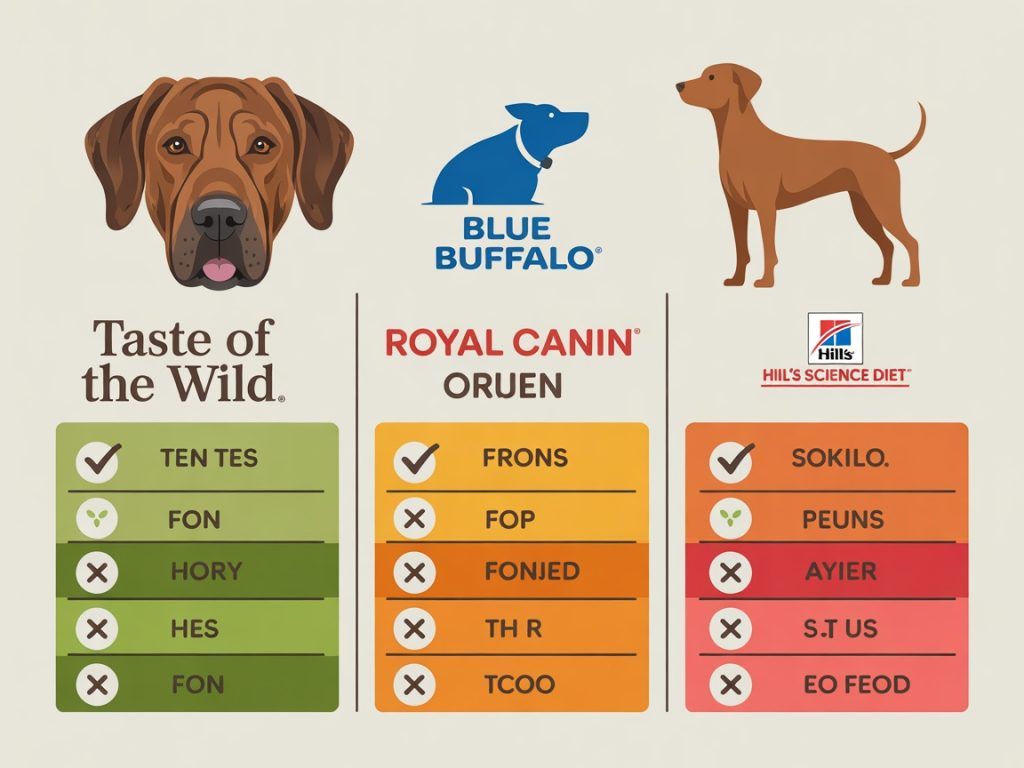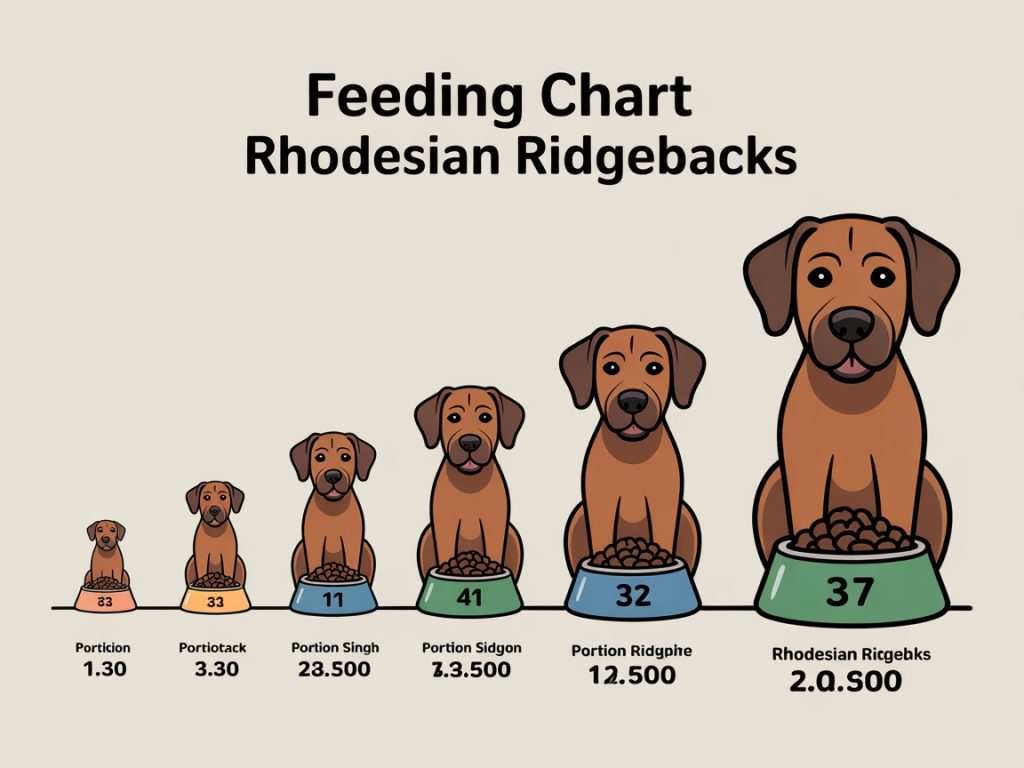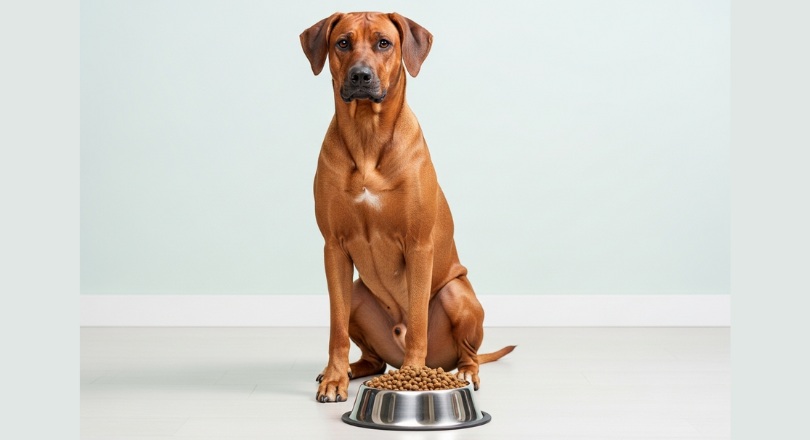Choosing the right dog food for Rhodesian Ridgebacks is vital for their health, performance, and longevity. This athletic, intelligent breed thrives on a diet that meets specific nutritional needs—helping them maintain strong muscles, healthy joints, and a shiny coat.
Below you’ll find expert insights, comparisons of the best dog food types, feeding charts, and ingredients to avoid, so you can make an informed decision for your Ridgeback.
Understanding the Nutritional Needs of Rhodesian Ridgebacks
Rhodesian Ridgebacks are large, active, and muscular dogs originally bred for hunting. Their diet should provide balanced, high-quality protein, healthy fats, essential vitamins, and easy-to-digest carbohydrates. Hydration and joint support are also crucial for this breed’s energetic lifestyle.
Key Nutrient Requirements:
| Nutrient | Function for Ridgebacks | Best Sources |
|---|---|---|
| Protein | Muscle & tissue maintenance | Chicken, beef, lamb, fish, eggs |
| Fat | Energy & coat health | Fish oil, flaxseed, animal fat |
| Carbs | Energy & digestive health | Sweet potatoes, brown rice, oats |
| Vitamins/Minerals | Immunity, bones, overall health | Vegetables, berries, organ meats |
| Water | Hydration, digestion | Fresh water, moist food |
Tip: Ridgebacks thrive on diets rich in animal protein and healthy fats, with moderate and low-glycemic carbs for slow energy release.
Best Dog Food Types for Rhodesian Ridgebacks
There’s no one-size-fits-all answer—the ideal meal depends on your dog’s age, health, and preferences. Still, most nutritionists suggest considering the following:
Raw Food Diet
Raw food closely mimics what dogs would eat in the wild: fresh meat, bones, offal, and some vegetables or fruits. This diet is high in protein and moisture and typically free of extreme processing and fillers. Raw diets can help manage weight and minimize allergies for some dogs19.
Premium Dry Kibble
Choose high-protein, minimally processed brands with real meat as the first ingredient and no by-products, excessive fillers, or artificial colors11.
Wet, Fresh, or Homemade Foods
Wet and fresh foods offer high moisture. Homemade diets grant ingredient control, but require careful supplementation—always consult a vet for balanced recipes35.
Comparison Table: Food Types for Rhodesian Ridgebacks
| Type | Pros | Cons | Example Brands |
|---|---|---|---|
| Raw Diet | High protein, moisture, minimal processing | Needs freezer space, prep time, must ensure balance | ProDog Raw, Bellfor, DIY |
| Premium Kibble | Convenient, shelf-stable, often fortified | Can be high in carbs or fillers if poor quality | Royal Canin, Victor, Yumwoof |
| Wet/Fresh | High moisture, very palatable | Pricier, may lack some nutrients if not complete | Freshpet, Farmer’s Dog |
| Homemade | Full control over ingredients | Labor-intensive; risk of imbalance | Vet-supervised only |
Best Dog Foods for Rhodesian Ridgebacks – Our Top Recommendations
Choosing the right food for your Rhodesian Ridgeback is essential for their health and energy. Below, we’ve listed and reviewed some of the top-rated dry and wet dog foods on the market—covering their main benefits, drawbacks, and what makes them great for this powerful breed.

1. Taste of the Wild High Prairie Grain-Free
- Pros: High protein, real roasted meats, grain-free, includes antioxidants.
- Cons: Grain-free may not suit all dogs, premium pricing.
2. Blue Buffalo Life Protection Formula
- Pros: Real chicken first ingredient, includes LifeSource Bits for antioxidants, affordable.
- Cons: Can cause digestive upset in sensitive dogs.
3. Royal Canin Large Breed Adult Dog Food
- Pros: Specifically formulated for large breeds, supports joint health, easy to digest.
- Cons: Contains corn and wheat, not grain-free.
4. Orijen Original High-Protein Dog Food
- Pros: Biologically appropriate, high-quality regional ingredients, grain-free, very high protein.
- Cons: Expensive, may be too rich for some dogs.
5. Hill’s Science Diet Large Breed
- Pros: Trusted vet recommendation, joint and heart health, balanced nutrition for large breeds.
- Cons: Less meat, contains grains.
How Much To Feed a Rhodesian Ridgeback: Daily Feeding Chart
Portion sizes should be tailored to your dog’s weight, age, and activity level. Overfeeding leads to obesity, a risk among all large breeds.

Recommended Daily Feeding Amounts (Adult Ridgeback 32–39kg):
| Weight Range | Daily Food Amount (Raw) | Typical Calories Needed | Notes |
|---|---|---|---|
| 32kg | ~640g | ~1,400–1,600 kcal | Highly active dogs may need more |
| 39kg | ~780g | ~1,700–1,900 kcal | Adjust for age/activity |
| Puppy | Calculated by age/weight | Higher calorie density | 2–3 meals/day, tailored portions |
For dried food, follow the brand’s guidelines and monitor your Ridgeback’s weight monthly.
Essential Supplements and Add-Ons
Most complete dog foods provide basic vitamins and minerals, but athletic breeds often benefit from targeted supplementation:
| Supplement | Why Add | Sources or Brands |
|---|---|---|
| Joint Support | Protects hips, knees, and elbows | Glucosamine, chondroitin, fish oil |
| Omega-3s | Promotes coat/skin health, joint health | Salmon oil, flaxseed oil |
| Probiotics | Digestive health | Yogurt, commercial powders |
| Antioxidants | Supports immunity | Berries, green vegetables |
Foods and Ingredients to Avoid in Rhodesian Ridgebacks
Some ingredients and table scraps can be dangerous or reduce the nutritional benefit for your Ridgeback.
Top Foods to Avoid:
| Dangerous Items | Reason |
|---|---|
| Chocolate | Toxic to dogs |
| Grapes/Raisins | Kidney failure |
| Onions/Garlic | Damages red blood cells |
| Xylitol | Can cause fatal low blood sugar |
| Highly processed/fatty table scraps | Obesity, pancreatitis |
Always read labels—avoid kibble with unspecified “meat meal,” cheap fillers, or artificial flavors.
For further tips, check out this guide on how to read pet food labels from the AVMA.
For more information on food safety and nutrition, visit the FDA’s guidelines for general pet nutrition.
Feeding Mistakes to Avoid
- Overfeeding: Leads to obesity and joint strain.
- Inconsistent meal times: Can disrupt digestion.
- Ignoring age/lifestage needs: Puppies, adults, and seniors all have different requirements.
- Skipping vet checkups: Nutritional needs may shift with age or health status.
Frequently Asked Questions
What’s the best dog food for Rhodesian Ridgebacks?
A well-balanced, high-protein diet with quality ingredients—often raw or a mix of premium kibble and fresh foods—is ideal.
How many times a day should I feed my Ridgeback?
Twice daily meals work well for most adults. Puppies need more frequent feedings.
Can Ridgebacks have grain-free food?
Yes, but ensure alternate carb sources. Always check with your vet due to recent debates over grain-free diets.
Should I use supplements?
Joint, skin, and coat supplements can benefit athletic Ridgebacks, but consult your veterinarian before adding anything new.
More – Pyrantel Pamoate Dosage for Dogs: Safe Use, Guidelines & Expert Tips
Final Tips: Keeping Your Rhodesian Ridgeback Healthy Through Diet
- Prioritize high-quality protein and healthy fats.
- Monitor weight and adjust food amounts as needed.
- Supplement for joint and coat health, if your vet advises.
- Avoid dangerous foods and poor-quality fillers.
- When in doubt, seek expert guidance—consider a consult with a veterinary nutritionist.

